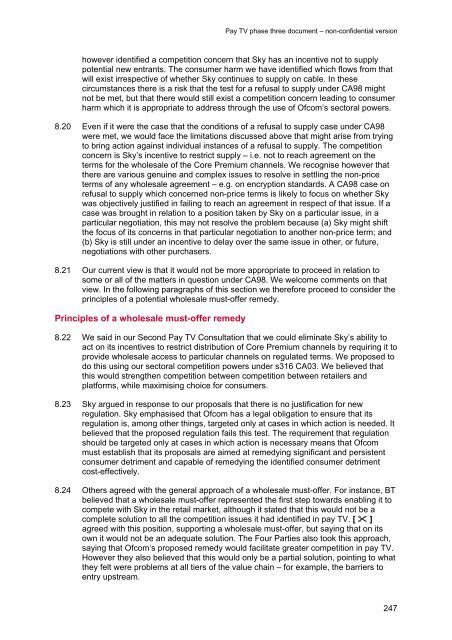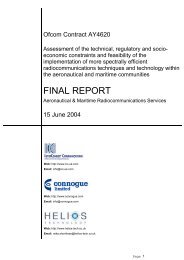Pay TV phase three document - Stakeholders - Ofcom
Pay TV phase three document - Stakeholders - Ofcom
Pay TV phase three document - Stakeholders - Ofcom
Create successful ePaper yourself
Turn your PDF publications into a flip-book with our unique Google optimized e-Paper software.
<strong>Pay</strong> <strong>TV</strong> <strong>phase</strong> <strong>three</strong> <strong>document</strong> – non-confidential version<br />
however identified a competition concern that Sky has an incentive not to supply<br />
potential new entrants. The consumer harm we have identified which flows from that<br />
will exist irrespective of whether Sky continues to supply on cable. In these<br />
circumstances there is a risk that the test for a refusal to supply under CA98 might<br />
not be met, but that there would still exist a competition concern leading to consumer<br />
harm which it is appropriate to address through the use of <strong>Ofcom</strong>’s sectoral powers.<br />
8.20 Even if it were the case that the conditions of a refusal to supply case under CA98<br />
were met, we would face the limitations discussed above that might arise from trying<br />
to bring action against individual instances of a refusal to supply. The competition<br />
concern is Sky’s incentive to restrict supply – i.e. not to reach agreement on the<br />
terms for the wholesale of the Core Premium channels. We recognise however that<br />
there are various genuine and complex issues to resolve in settling the non-price<br />
terms of any wholesale agreement – e.g. on encryption standards. A CA98 case on<br />
refusal to supply which concerned non-price terms is likely to focus on whether Sky<br />
was objectively justified in failing to reach an agreement in respect of that issue. If a<br />
case was brought in relation to a position taken by Sky on a particular issue, in a<br />
particular negotiation, this may not resolve the problem because (a) Sky might shift<br />
the focus of its concerns in that particular negotiation to another non-price term; and<br />
(b) Sky is still under an incentive to delay over the same issue in other, or future,<br />
negotiations with other purchasers.<br />
8.21 Our current view is that it would not be more appropriate to proceed in relation to<br />
some or all of the matters in question under CA98. We welcome comments on that<br />
view. In the following paragraphs of this section we therefore proceed to consider the<br />
principles of a potential wholesale must-offer remedy.<br />
Principles of a wholesale must-offer remedy<br />
8.22 We said in our Second <strong>Pay</strong> <strong>TV</strong> Consultation that we could eliminate Sky’s ability to<br />
act on its incentives to restrict distribution of Core Premium channels by requiring it to<br />
provide wholesale access to particular channels on regulated terms. We proposed to<br />
do this using our sectoral competition powers under s316 CA03. We believed that<br />
this would strengthen competition between competition between retailers and<br />
platforms, while maximising choice for consumers.<br />
8.23 Sky argued in response to our proposals that there is no justification for new<br />
regulation. Sky emphasised that <strong>Ofcom</strong> has a legal obligation to ensure that its<br />
regulation is, among other things, targeted only at cases in which action is needed. It<br />
believed that the proposed regulation fails this test. The requirement that regulation<br />
should be targeted only at cases in which action is necessary means that <strong>Ofcom</strong><br />
must establish that its proposals are aimed at remedying significant and persistent<br />
consumer detriment and capable of remedying the identified consumer detriment<br />
cost-effectively.<br />
8.24 Others agreed with the general approach of a wholesale must-offer. For instance, BT<br />
believed that a wholesale must-offer represented the first step towards enabling it to<br />
compete with Sky in the retail market, although it stated that this would not be a<br />
complete solution to all the competition issues it had identified in pay <strong>TV</strong>. [ � ]<br />
agreed with this position, supporting a wholesale must-offer, but saying that on its<br />
own it would not be an adequate solution. The Four Parties also took this approach,<br />
saying that <strong>Ofcom</strong>’s proposed remedy would facilitate greater competition in pay <strong>TV</strong>.<br />
However they also believed that this would only be a partial solution, pointing to what<br />
they felt were problems at all tiers of the value chain – for example, the barriers to<br />
entry upstream.<br />
247
















